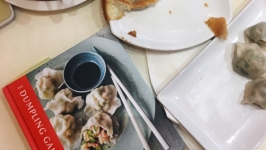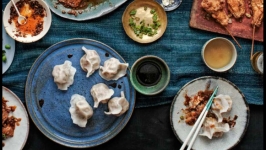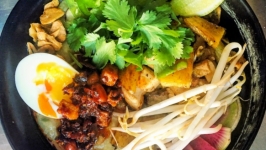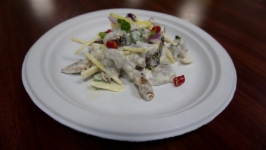Butter Tea: A Frame, the Best Suja this side of Bhutan
On the first warm Friday night of spring, Weekender Billiard is banging. Beneath a portrait of Bhutan’s dragon king and queen, a group of women sing impromptu karaoke. A couple of raucous groups dig into bowls of cheesy ema datshi. And over by the billiard tables, half a dozen snooker players mark the hours with bottles of beer.
Although, as co-owner Lhendup Zangmo is quick to point out, “Everyone starts with a cup of tea.”
She means butter tea—suja in Dzongkha, Bhutan’s national language—made with tea leaves boiled with water into an inky black liquor, then frothed with salt and lumps of butter for a creamy, fortifying brew to scare away the cold. In the Himalayas’ forbidding climate, warming and nutrient-dense butter tea is an essential part of a mountaineer’s diet. At Queens’ 20-odd Tibetan and Nepali restaurants, a styrofoam cup of the drink is a welcome reminder of home.
But no butter tea in Queens tastes like Weekender’s. Earthy with a mineral twang and redolent of campfire smoke, the suja here is the brewed essence of the mountains. The first sip feels rugged and rarified. By the time you down your cup and lick the buttery film off your lips, you’re ready to wrestle a yak.
Recent decades have seen a boom in Himalayan immigration to Queens, but its Bhutanese population remains relatively small. Currently, Weekender Billiards is the only restaurant in the city representing the kingdom’s cuisine, so when Zangmo and her husband, Jamyang Tsultrim, imagined a menu for the billiard hall and bar, she felt a responsibility to get the essentials right.
“We’ve drunk suja since we were kids,” Zangmo says. “Any special gathering, any time a guest visits, you make it. There’s nothing like it in America. So when people come to eat here, they expect that taste.”
Without a source for the fermented tea leaves that usually go into butter tea, most Himalayan cooks in Queens adapt with Lipton tea bags. The resulting brew suffers, lacking the horsey, robust character of the genuine article. Which is why Zangmo gets her tea straight from Bhutan, and totes it back to the U.S. in her luggage, 20 pounds at a time. It’s one of several ingredients she and a loose network of Bhutanese expats hand-import for the restaurant, like fiery ema kam chiles to give the kitchen’s remarkable squash soup a holy sting.
The “tea” is a jumble of twigs and bark, picked from wild trees in Bhutan’s eastern forests and dried over smoky fires. Once boiled for 20 minutes to extract its full essence, the brew is tar-colored; butter mellows its rough edges while preserving its pungent flavor. To the uninitiated the tea takes getting used to, but for Weekender’s core crowd it tastes just right. The drink has been a popular menu item since the billiard hall started serving food, and even Zangmo’s Tibetan-born husband has come around to it.
In Weekender’s early days, Zangmo, Tsultrim and their partner Pema Gyeltshen had to work side jobs to make ends meet. But today the restaurant is thriving. The potato-and-cheese momos draw fans from other boroughs. The snooker players keep the place lively. And the pot of suja continues to boil, welcoming everyone who’s missed the taste of it.









